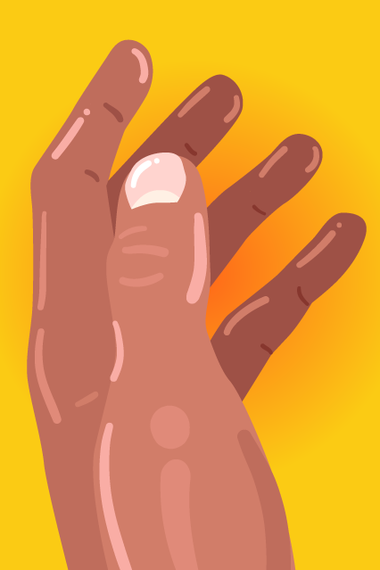On a recent trip to the beach, my friend asked me if he could compliment my tan. It took me a minute to realize what he meant. My family is Indian, my parents moved to the States several years before I was born, so my skin is always naturally some shade of brown. My buddy said he'd never presume to casually turn to a person of color and exclaim, "Nice tan!"
Point taken.
But in my case, I told him to fire away. My beach game has been strong this year, and as summer winds to a close, I'll be doing everything I can to keep my skin looking golden-brown well into fall.
I realize this runs contrary to how some people with my skin tone approach the end of another season in the sun. Beauty headlines about treating sunspots, exfoliating for skin renewal, and even applying flat-out skin-lightening products speak to certain ethnicities of women for whom fair skin is the ideal, my mother among them. Full disclosure: I'm a guy, and the most elaborate product I use on my face is mustache wax. So I am not the target audience for these products. But as a second-generation immigrant, I also grew up with a very different attitude toward my skin tone than my parents did.
When we were kids, my folks made every effort to assimilate my brother and me. So much so that I rarely thought about having a different skin color than my mostly white peers. Perhaps my point of view would have developed differently had I grown up around more Indian kids, or other children of color. But as it happened, I adopted a similar attitude toward melanin as my white friends. At my private school, having a tan was a sign of status; it meant tropical vacations with a family who had money and time to spare on leisure.
But when I started purposely wanting to tan my skin, my parents thought I was nuts. Firstly, they're doctors, so they were sure to inform me at a young age about the dangers of sun damage. Though my skin's melanin protects me from getting sunburned as quickly as my paler friends, it doesn't make me immune -- neither from painful burns nor from skin cancer.
I learned from my parents, and from my own experience in the sun (not to mention a stint working for a health magazine) that wearing the proper SPF is just as important for me as for anyone else. Sunscreen doesn't prevent skin from getting tan (my parents taught me that, too).
Beyond issuing me medical warnings, my parents also come from a culture where the ideal of having fair skin has a long, convoluted history -- one that is deeply rooted in class, caste, and sectarian division. India's robust industry of lightening products promises to deliver complexions closer to those of Bollywood's leading players, who are almost invariably very light-skinned. The pressure for women to be lighter-skinned is much stronger, while the Bollywood culture is more forgiving and readily accepting of men with slightly darker complexions.
Incidentally, I can see how this plays out close to home. My dad doesn't give much thought to his tan, which can grow several shades darker as he spends more time outside during summer. Meanwhile, no brim is too wide for my mom, who has an impressive collection of visors and sun hats. Oversized shades have likewise been one of her fashion hallmarks since the '80s. She takes these measures to protect her skin from damage, but also to maintain her natural fairness -- the color she has been her entire life, the one that makes her feel most like herself.
And here I was pursuing the opposite ideal.
I'll admit with some embarrassment that, at first, I was blindly marching to the drumbeat set by my white peers in their pursuit of the perfect tan. I didn't think of myself as different from them. I realize what a blessing it is that I was able to maintain that ignorance, because I didn't face the kind of racism that so many people of color do. I didn't look at them and think, I want to be white; in some sense, I already felt that I was.
But as I grew more self-aware, I turned to embrace my cultural difference rather than remaining willfully blind to it. College happened, I moved away from home, and I woke up. There came a turning point at which darkening my skin in the sun transformed into a very personal, even prideful, choice: I love being brown. As an adult, tanning to me is about highlighting my difference, rather than falling in line with what anyone else is doing.
I like how it feels to be different than my white friends, and I love that something as relaxing as lying on the beach helps me feel more like myself when I look in the mirror afterward. I imagine it's the same feeling someone who loves her freckled cheeks gets when she sees herself smiling back in her reflection. When my skin inevitably lightens during winter, I often feel I look sallow and even vaguely like my body is betraying me. After I come in from the sun, I feel my face looks healthier and more like my own, that even my limbs look somehow stronger and more capable. Tanning to me is not about showing off to anyone that I'm winning at summer by spending time at the beach. It's about feeling confident in my own skin, and like I am presenting the best version of myself to the world.
But just because for me, darkening my skin is about pride, that doesn't mean for someone like my mom, striving for fair skin means she is ashamed of being Indian. Isn't it a double standard to turn around and accuse people of color who strive for lighter skin of cultural shame? Would anyone think to ask whether a white person who likes to tan is ashamed of being white?
Like any other decision we make in how to present our bodies, whether someone enjoys being tan or prefers to have fairer skin is deeply personal and wrapped up in questions of identity politics. Of course, race is not a choice -- and effecting any change in skin tone certainly isn't as simple as, say, dyeing your hair. But how we feel about our complexions and what they mean to us? It's hard to think of anything more personal than that.
As for me, so many of us in this country will tell you that it's not easy, but I love not being white. When I'm tan, I feel more like myself -- a beautifully brown, nonwhite American. And yes, you may pay me your compliments for that.
By: Naveen Kumar

